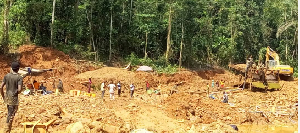 File photo of a galamsey site
File photo of a galamsey site
Fredrica Hanson, the leader of the International Conference of Midwives, has urged the government to intensify the fight against illegal mining and help protect the country’s water bodies.
She said water plays a critical role in the delivery of newborns; hence, there is a need to safeguard water resources to ensure a reliable supply to health facilities.
“We need the moral and political will to enforce the laws against illegal mining…babies are being born with deformities and there are still births in most facilities,” she noted.
Mrs Hanson made the call in her presentation on the topic: “The State of Midwifery in Crisis Situation in Ghana: Challenges and Opportunities.”
The lecture preceded the National Celebration of International Midwives Day in Takoradi in the Western Region.
The health professional highlighted challenges, including a lack of skilled personnel, poor working conditions, attitude of staff, and non-emergency preparedness, as some setbacks to Midwifery practice in Ghana.
She urged practitioners to embrace digital technologies, maintain a positive attitude, and mentor young talents to join the profession.
Speakers who participated in a symposium on the theme: “Midwives, Critical in Every Crisis” touched on the security of health workers in conflict zones, professionalism, work ethics, and called for adequate resources to enable midwives to provide essential services.
The symposium was to transform the International Midwifery Day into an empowering and educational event, fostering discussions, sharing evidence-based practices, and addressing midwifery challenges through advocacy.
The speakers were Mrs Eva Mensah, Director in charge of Nursing and Midwifery, Ghana Health Service, Colonel Mary Amofa Ampofo, Nursing Officer in Charge of Obstetrics and Gyneacological Division of the 37 Military Hospital, Dr Gifty Amugi, Acting Director, Western Regional Health Directorate of the Ghana Health Service and Alhaji Haliq Adam, Health Program Manager of the Catholic Relief Service.
They raised concerns about the absence of strong infrastructure, limited resources, including accommodation for midwives in Community Health and Planning Services (CHPS) compounds, and poor conditions of service for staff members.
Midwives, they said, served as first point of call and played a critical role in reducing maternal mortality, providing 87% of essential maternal and newborn care and needed to be well-resourced to deliver on their mandates to save lives.
They also called for expert supervisors to identify gaps and make positive and impactful contributions to health facilities, continuous capacity building to bridge the skill development gap, design mentorship programmes for staff, provide institutional system support for midwives, and professional networking.
They also urged midwives to help maintain health systems and empower women and communities to take control of their health, particularly in crisis situations.
Mrs Netta Forson Ackon, President of the Ghana Registered Midwives Association, said midwifery had evolved from traditional practices to a professional field, providing safe and natural childbirth with minimal medical intervention.
She called for the need to enhance midwifery care to ensure every woman experiences childbirth with dignity, respect, and skilled support.
